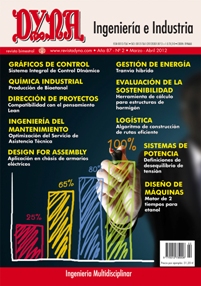APPLICATION OF DESIGN-FOR-ASSEMBLY TO DEVELOP A NEW CHASSIS FOR ELECTRICAL CABINETS
Keywords:
Proceso de Diseño, Diseño para el Ensamblaje (DFA), Procesos de Montaje, Armarios Eléctricos, Design Process, Design for Assembly (DFA), Assembly Process, Electrical CabinetsAbstract
Introduction The technique related to the elaboration of electrical cabinets provides, in most cases, solutions that imply a high heterogeneity of pieces, high costs, complexity and excessive time of assembly. Moreover, it does not allow to exchange pieces between the cabinets of different manufacturers, which generates individualized and not reusable structures. In particular, the structures responsible for supporting the electrical devices and wiring, collectively known as the chassis of the electrical cabinet, is a paradigmatic example of this problem for its high impact on the time and cost of assembling a standard electrical cabinet. Materials and Methods In order to reduce this problem, we have used the Design-for-Assembly (DFA) method to evaluate existing designs and create a new chassis from the point of view of the assembly stage. DFA method considers aspects of the final assembled process in early stages of the conceptual design, providing an effective methodology for the achievement of new designs, more robust, simple and objectively reliable. Results A new chassis were designed according to the guidelines of the DFA method, after being identified the problems and evaluated a representative sample of the different existing chassis. It has been reduced the number of parts and increased their versatility and ease of assembly. Conclusions Finally, we have obtained a new chassis which improves the results of the prior DFA evaluation and reduces the time and cost of manufacture. In addition, DFA method has been proved as an effective guide in the conception and implementation of new designs.Downloads
Published
2012-03-01
Issue
Section
ARTICULOS

